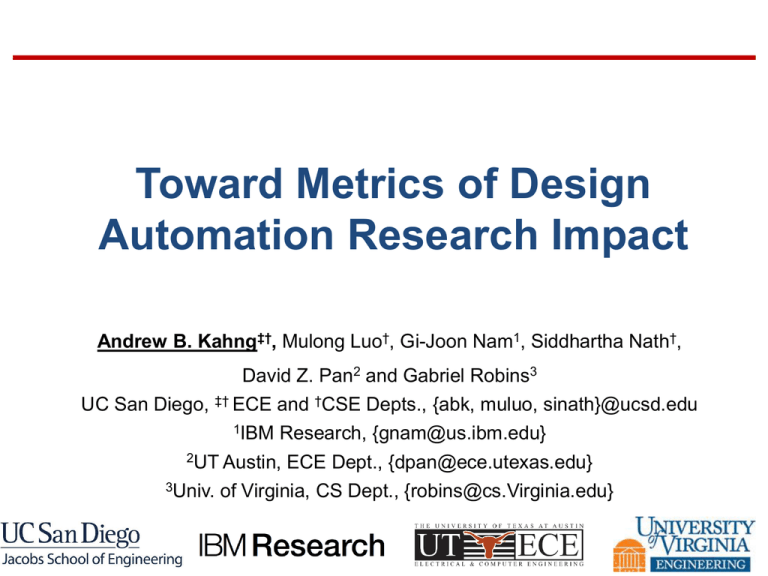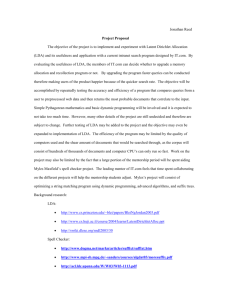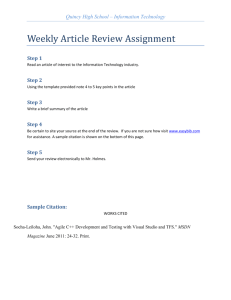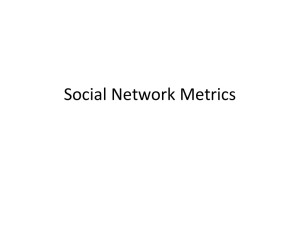Slide - UCSD VLSI CAD Laboratory
advertisement

Toward Metrics of Design
Automation Research Impact
Andrew B. Kahng‡†, Mulong Luo†, Gi-Joon Nam1, Siddhartha Nath†,
David Z. Pan2 and Gabriel Robins3
UC San Diego, ‡† ECE and †CSE Depts., {abk, muluo, sinath}@ucsd.edu
1IBM Research, {gnam@us.ibm.edu}
2UT Austin,
ECE Dept., {dpan@ece.utexas.edu}
3Univ. of Virginia, CS Dept., {robins@cs.Virginia.edu}
1
Motivation
• Design automation (DA) research outcomes have
many forms
• Publications, patents, degrees awarded, …
• Research impacts are hard to quantify
• There is an entire “life cycle” of DA research
• Could understanding research impacts help with
• Early identification of high-value research directions ?
• Increased overall investment in DA research ?
DA Conferences
Government
workshops
keynotes
Journal
papers
(early)
Consortia
tutorials
technical
papers
special
sessions
(late)
hands-on
tutorials
Academia
Semiconductor
industry
Patents
exhibits
EDA industry
2
Our Study
• Compiled DA research corpora
• 750K+ patents, 47K papers, government-funded project
abstracts, industry needs statements
• Applied bibliometric analyses
• Latent Dirichlet allocation (LDA) for topic modeling
• Structure in patent citation graph
• Notional analyses of papers, patents, funding,
industry structure (startups, tools)
• Stasis vs. change
• Latencies
• SRC program -> research papers
• Papers -> commercial tools
• Still unsolved: “metrics of DA research impact”
3
Overall Data Collection and Analysis Flows
Data collection
Conference PDFs
DA-Related USPTO
Patent HTMLs
Journal PDFs
Types of Studies
Convert to Text and
Preprocess
Create Citation Graph
Run LDA and Extract Topics
Perform Network Analyses
Example Results
Statistics of Word Counts,
Bhatta, Entropy Distance
Metrics, Visualizations
Report Centrality, Transitive
Fanouts, Fanins
DA
Metrics
(Future)
4
Stasis vs. Change in DA Research
• Papers evolving rapidly over 2011-2014, 2006-2009,
1998-2001 (= “new fields” ?)
• Papers exhibited stasis over 1994-1997, 1991-1993,
2004-2007, 2005-2008 (= “consolidation” ?)
Bhatta distance (see backup) between ICCAD papers of a given year and ICCAD
papers of two or three years earlier.
5
Latency Analysis
• Conference literature reflects NSF, SRC project topic
mix of three years earlier [distance decreases]
• Project topic mix could be a trailing indicator that is
then reinforced by “mass market” [early uptick?]
6
Topic Evolution via LDA
• Each textfile represented as a vector based on word frequency
• Corpus of papers (e.g., ICCAD99) = set of vectors which are
inputs to the LDA analysis
• LDA analysis finds top-K topics
12-topic LDA models for years 1964-1970, 1980-1985, 19952000, 2010-2015 of DAC, ICCAD, DATE and ASPDAC
7
Evolution and Latency via Incidence Curves
Incidence curves of selected terms, in all
47000+ papers
Incidence curves of several of these
terms, in conference (solid) and journal
(dotted) papers
8
USPTO Patent Citation Graph Analyses
• 759507 USPTO patents corpus
• 4717209 edges, 490079 sinks
• Calculate transitive fanouts and betweenness centrality
measures
• Betweenness centrality [1] measures the extent to which a vertex
impacts and connects related fields
Fanout cone size distribution
of vertices (patents)
Fanout cone size distribution
of vertices (patents)
[1] L. Leydesdorff, ““Betweenness Centrality” as an Indicator of the “Interdisciplinarity” of Scientific Journals”, J. of
ASIST 58(9) (2007), pp. 1303-1319.
9
Many Gaps
(we have made only initial steps!)
• Little progress toward “metrics” of research impact
• How to measure:
• Professor X trains student who founds an EDA company… ?
• Paper Y proposes a technique that is incorporated in many
EDA tools and product ICs… ?
• Need analyses of citation graphs, papers as in [2]
• Dynamic growth, core-periphery analysis, etc.
• Temporal analyses of topic evolution are simple so far
• Not yet applied: autoregression, temporal latent factors and
time-series modeling to track topic evolution
[2] T. Chakraborty et al., “On the Categorization of Scientific Citation Profiles in Computer Sciences”,
Communications of the ACM 58(9) (2015), pp. 82-90.
10
Toward DA Research Metrics
• Inputs, participation welcome
(form at http://vlsicad.ucsd.edu/DA-METRICS/)
• Apply more known analysis methods (e.g., as in [2])
• Develop paper citation graphs
• Retrospective assessment of indicators of impact
(“best paper” vs. “test of time”)
• Statistical, machine-learning temporal models for realworld impacts of both individuals and research results
• Develop predictors of future high-impact DA research!
11
THANK YOU !
12


